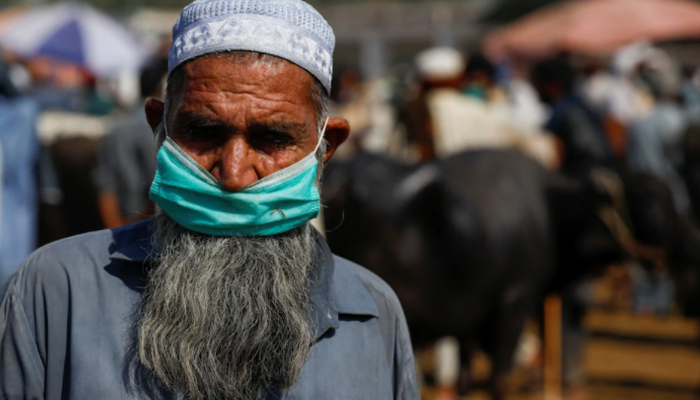War against COVID-19 still on: Alvi, Umar warn nation against resurgence due to negligence
NCOC chief Asad Umar says while cases may have reduced, "the risk is still alive"
August 22, 2020

President Arif Alvi as well as National Command and Operations Centre chief Asad Umar on Friday warned the nation against a lax attitude in taking precautions, stressing that the war against COVID-19 is still on.
"While Pakistan is winning the war against coronavirus, the battle is still raging," President Alvi said.
"Do not let your guard down in exercising precautions, for your own sake, and for the sake of your relatives and friends," he added.
The president's remarks were preceded by a statement from the National Command and Operation Centre chief Asad Umar who issued a similar warning.
He said that the NCOC is prepared for "every occasion which can increase cases", citing Eid, Muharram, and the reopening of schools as examples.
Umar said while cases may have reduced, "the risk is still alive".
His words came as a study carried out by the Health Services Academy in July in collaboration with multiple partners including Agha Khan University (AKU) and with technical support from World Health Organization (WHO) revealed that almost 11% Pakistanis have developed protective immunity and have antibodies in their blood against COVID-19.
The study was part of the WHO Unity Study also being conducted simultaneously in 25 other countries, said a statement issued today by the Ministry of National Health Services, Regulations and Coordination.
Seroprevalence studies are carried out with an objective to assess as to what percentage of the population has developed protective immunity (antibodies) to the virus.
Seropositivity was found more in urban areas compared to rural areas.
It was more common in young adults and significantly less in children and older adults.
The results corroborate findings from studies conducted elsewhere and identify older individuals at the highest risk from a possible second wave.
Pakistan has been reporting a decline in cases but medical experts have warned of a resurgence as the government considers the reopening of schools. Businesses have already been allowed to operate subject to the adherence to safety precautions.
According to a report by The Telegraph: "Officials leading the government's response say it is too early to declare victory, and admit the reasons behind the fall are not fully understood."
“One ought to have a little humility in this,” it quoted Dr Faisal Sultan, the premier's special aide on health, as saying.
“There are always great unknowns in science and epidemiology and complex social sciences and interactions. If anyone says they really know a final answer, they are wrong.”
In the last 24 hours, the government's COVID-19 dashboard reported 630 new infections and 10 more deaths. This is a sharp fall from June when the daily tally was more than 6,000 on average and the death toll pushed 150 at one point.
The country's total confirmed cases currently stand at 291,588 whereas the death toll is 6,219.
Dr Sultan told The Telegraph that despite the promising signs, he remained cautious.
“At the end of the day I keep reminding people that this is like smouldering embers and the embers are there. You provide them with fuel and with a little bit of oxygen, they will flare up,” he said.











